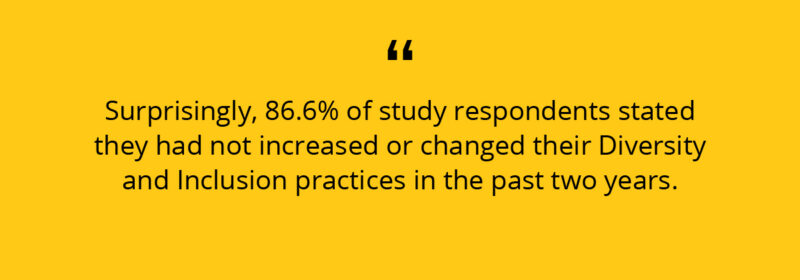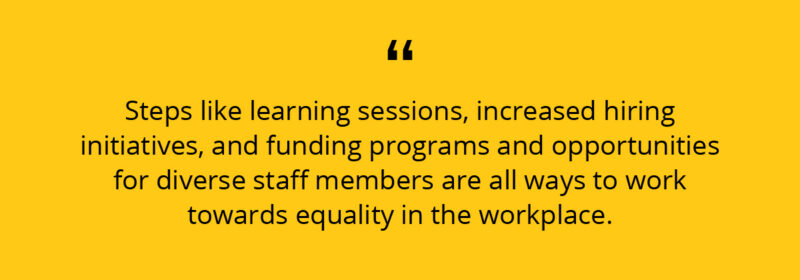By Darian Kovacs, Founder, Jelly Digital Marketing & PR
The last two years have brought on many changes, shifts, and new approaches for Canada’s businesses. The global pandemic alone was enough to alter the way we approach business functions but alongside this, there were many large and impactful cultural events such as the Black Lives Matter movement, Missing and Murdered Indigenous Women, and Every Child Matters that urged for more effort surrounding Diversity and Inclusion policies from all industries.
Based on these events, Jelly Academy wanted to dive specifically into how hiring and company practices have changed in the past two years for tech and digital marketing industries. In early 2022, Jelly Academy ran a survey, sponsored by Innovate B.C., that interviewed 1,532 Canadian hiring professionals in varying industries including technology, marketing, retail trade, healthcare, life sciences, and education hiring for these roles. From this survey they were able to gather data on how hiring has changed, ways in which Diversity & Inclusion has been incorporated into company culture, and how company policies have shifted.
The study revealed that many participants have felt the effects of the pandemic for hiring, with 56.64% noting hiring for digital marketing and tech roles has become mildly to very difficult. While these were the roles difficult to hire for, they were also the roles respondents were looking to hire for the most. The roles listed included SEO, social media, digital ads, PR, content creation, website development, and software development. This is likely based on the pandemic being a catalyst for digital and tech skills being in demand, with not enough skilled-workers in the field.
While there have been many downsides to the pandemic, it has also set in motion the transition to working digitally and relying more heavily on digital platforms. 50.25% of the respondents stated that digital hiring tools, such as LinkedIn and Indeed, have made hiring more simplified. Continuing to utilize these tools will assist in the process of hiring for the much in demand tech and digital roles.
The study found that flexible work environments may be one of a few solutions to finding skilled tech & digital workers. 37.31% of participants said that offering flexible work schedules has increased the number of applicants they receive for these roles. Flexible schedules include hybrid, remote, flex time, and compressed work weeks. Based on these results, it would be beneficial to hold onto these changed work schedules as they are providing balance for employees and applicants for employers. The changes in hiring have been advantageous and show just how flexible these industries can be, and how they prioritize innovation to problem solving.

Diversity and Inclusion has been a relevant topic for companies for some time, but only in the past two years has it become widely discussed and emphasized. Larger social movements, such as Black Lives Matter, really urged companies to have more transparency in their efforts, demonstrate commitment to diversity, and be held accountable. Based on this, the study had questions around how much has changed since this topic of conversation has come to the forefront in the past two years. Surprisingly, 86.6% of study respondents stated they had not increased or changed their Diversity and Inclusion practices in the past two years. Alongside this stat, 34.33%, the highest collection of respondents for the given question, noted their workforce was only 5-25% of a visible minority.
When comparing these results with 70.23% of respondents noting they believe their industry peers had increased Diversity and Inclusion efforts, there is clear inconsistency. It is hard to say exactly why these stats are so contradictory but it could come down to public facing efforts that may be more emphasized than internal policy. If anything, these results are important reminders that brand image management may be a factor and there is still much work to be done in this department.

The only way to make these statistics more cohesive is by increasing action around diversity and inclusion. Steps like learning sessions, increased hiring initiatives, and funding programs and opportunities for diverse staff members are all ways to work towards equality in the workplace. The businesses surveyed for this study, and other companies in the tech and digital industry, should apply their available resources and commit to concrete, long-term Diversity and Inclusion initiatives.
This study provided enlightening and useful results that should be taken into consideration for tech and digital companies when approaching hiring and Diversity and Inclusion policies. The study showed the aspects in which the industry has changed in the past two years, and where little to no shifts have occurred for others. Results from the study such as increased job applicants when offering flexible work schedules, and digital tools making the hiring process more simplified, show how despite the challenges over the past two years, the digital and tech workforce has not stopped evolving. For the two industries, tech and digital marketing, that are so quickly adapting and putting emphasis on innovation the past two years, it is key that this same mentality is applied to efforts for Diversity and Inclusion. The ability, the innovative minds, and the tools are all there for these industries, they just need to utilize them.
Jelly Digital Marketing & PR is a member of the Institute of Canadian Agencies. Report on Marketing is where leading Canadian agencies showcase their insights, cutting-edge research and client successes. The Report on Marketing provides a valuable source of thought leadership for Canadian marketers to draw inspiration from. Find more articles like this at the Report on Marketing.
See all Ideas & Insights




